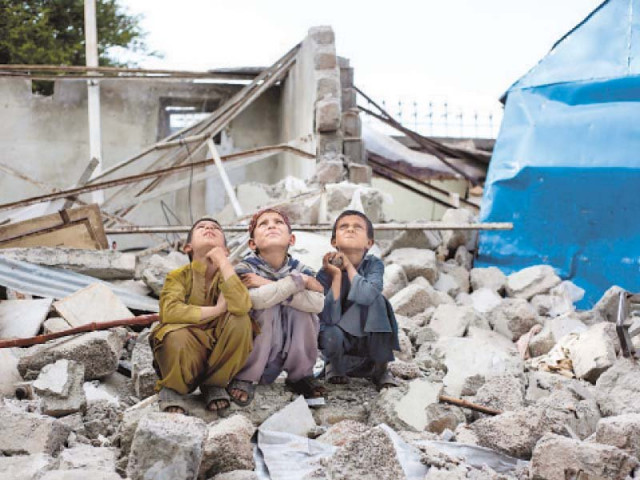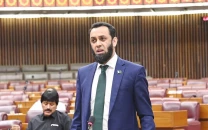Future in peril: For most Afghan refugees, school is not an option
Children forced into labour for lack of better alternative.

Afghan children sitting on the remains of the Pehli Kiran school. PHOTO: FILE/EXPRESS
Far too young and fragile to be working, the little boy should have been in school, or safe at home. This is the first impression you get when you see nine-year old Zayar Khan, an Afghan refugee, struggling to push a handcart filled with several dozen watermelons along the road leading to Islamabad’s biggest bus terminal.
Wearing a loose outfit spotted with countless stains, he has to rest after short intervals. His job is to transport fruit to a large store half a kilometre away from a shop at the terminal. He typically makes 10 to 12 trips and earns over Rs 120 a day.
Till April 14, Zayar was a student of third grade at a school run by a non-governmental organisation (NGO) for refugees in Sector I-10, when the capital’s civic agency razed the school terming it an illegal facility being established on encroached land. Today, Zayar is among 80 per cent Afghan refugee school-aged children in Pakistan, who are out-of-school.
According to the United Nations High Commissioner for Refugees (UNHCR), only five per cent of registered Afghan refugees have completed primary education.
Lack of government attention and denial of the fundamental right to education to refugee children has forced them to join the ranks of child labourers or opt for free religious education.
“After the school’s demolition he had nothing to do, so I advised him to work and earn money,” said Zayar’s father Pehlwan, 35, adding it was difficult for him to say the words. “I cannot afford to send my son to a private school. Though they do not ask for citizenship or identity details like government schools but they charge a hefty fee.”
Zayar represents the second generation of Afghan refugees in Pakistan who fled Afghanistan due to violence post 1979.
At present the government has no stated policy on the admission of refugee children to state-run schools. Rafique Tahir spokesperson for Capital Administration and Development Division said the government facilitates admission of Afghan refugee children to state-run schools. Parents are required to present a certificate of approval from the Afghan consulate for admission, he added. “Hundreds of Afghan nationals are studying in state-run educational institutes.”
It’s not as straightforward as the spokesperson claimed. A senior official, who declined to be named, said students enrolled in state-run institutes belong to affluent Afghan nationals who run successful businesses and are not considered refugees.
“It’s almost impossible for poor and illiterate parents to complete the procedure required to get a no objection certificate from the consulate,” he stated. “In a number of cases principals of government schools have refused to enroll Afghan refugee children for no reason.”
“We believe that there should be no discrimination in enrolment in educational institutions for students anywhere in the world, especially in elementary and secondary schools,” said UNHCR Public Information Officer Dunya Aslam Khan.
“With help from other UN agencies, the UNHCR is providing primary education to some 73,000 Afghan children in 174 primary schools and 7,000 students in secondary schools in refugee villages across Pakistan.” Despite efforts, the statistics are poor in terms of primary enrolment, she added.
“In collaboration with governmental and non-governmental organisations, UNHCR assists refugee children in obtaining primary school education. Approximately, 77450 students, 23,616 girls and 56,867 boys, in over 76 refugee villages of which 10 are in Balochistan, one in Punjab and 65 in Khyber-Pakhtunkhwa, are enrolled in primary schools, Khan said, adding we require more support nationally and internationally to enhance the enrollment ratio.
International Labor Organisation (ILO) Senior Programme Officer Saad Gilani said, “ILO found that almost 98 per cent of Afghan refugee children opted for the informal sector, which increases their vulnerability on several fronts.”
A social worker, Ali Kakazai, vice chairman of Al-Amin Trust, an NGO, which helps poor refugee children to obtain primary education, said if the enrollment ratio of refugee children did not improve, these children would neither be able to contribute to the betterment of their community in the host country, nor will they be able to play a role in rebuilding Afghanistan.
The government should enforce the same rules for the enrollment of Pakistani and Afghan children, at least till primary school, he stated. “Pakistan has to fulfil national and international commitments and it should evolve a strategy to ensure maximum enrollment of refugee children in schools.
Published in The Express Tribune, June 1st, 2014.



















COMMENTS
Comments are moderated and generally will be posted if they are on-topic and not abusive.
For more information, please see our Comments FAQ